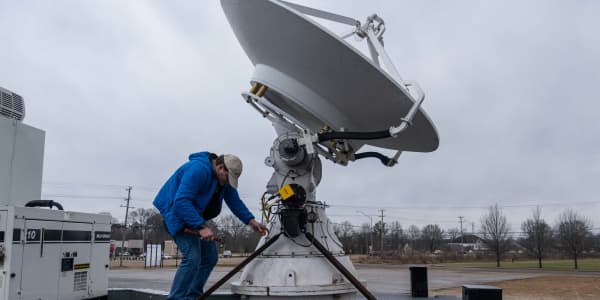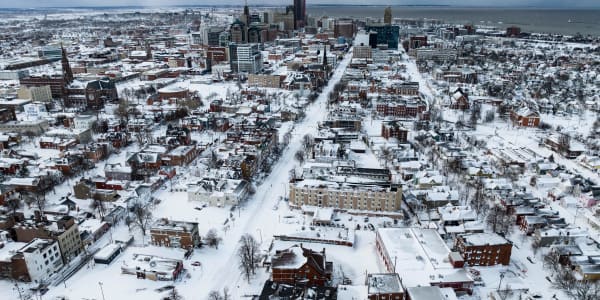How bad are America’s roads, bridges, ports and utilities? Pretty bad. That's why the American Society of Civil Engineers has given the United States a D + grade for its infrastructure in its most recent report on the state of American infrastructure. The U.S. Department of Transportation estimates it could cost as much as $1 trillion just to bring the current interstate and highways system in the United States up to date.
President Donald Trump has made fixing America's aging infrastructure a top priority. His goal: to ante up $200 billion in federal funding meant to encourage $1.5 trillion in overall investment from states, municipalities and private entities. It's expected he will push his agenda after the midterm elections.
“Frankly, it affects our quality of life and economic prosperity,” said American Society of Civil Engineers past president, Greg DiLoreto.
But we found some states bucking the trend. Infrastructure is one of the most important categories in CNBC’s exclusive America’s Top States for Business study, worth 400 out of 2,500 total points. We use government data to measure every state’s roads, bridges, airports, rail networks, ports, water utilities — even the time it takes to commute to work. These 10 states are following the right route to success.
10. Utah
Never mind that the nearest ocean is more than 800 miles away. Landlocked Utah is trying to establish itself as a port. The Utah Inland Port, approved in 2018 after years of debate, is billed as the largest public-works project in state history. Spanning 22,000 acres outside of Salt Lake City, the facility will include rail links to the Pacific Coast and freight hubs for trucks bound for the rest of the United States, Canada and Mexico, all aimed at substantially increasing exports from the Beehive State. But that is in the future. Today Utah's roads and bridges are among the best in the country, letting workers buzz through their daily commute.
2018 Infrastructure score: 246 out of 400 points (Top States Grade: B+)
Deficient bridges: 2.9 percent
Average commute to work: 21.6 minutes (U.S. average: 25.7 minutes)
Major airport: Salt Lake City International
20-year water-system needs: $4.4 billion
8. (tie) Nevada
After more than two years of detours and road closures, Nevadans are within months of enjoying the benefits of the largest public-works project in the Silver State’s history. Project Neon, slated for completion in 2019, is a $1 billion widening of Interstate 15 in Las Vegas. Officials are betting it will vastly improve traffic in the tourism and convention mecca. But Nevada is already on the move, with some of the best-maintained bridges in the country. A fast-growing state in the middle of the desert is not without issues, however — specifically, an aging and overburdened water system.
2018 Infrastructure score: 247 out of 400 points (Top States Grade: B+)
Deficient bridges: 1.6 percent
Average commute to work: 24.1 minutes
Major airport: McCarran International (Las Vegas)
20-year water-system needs: $5.3 billion
8. (tie) Florida
Florida is a major gateway to Latin and South America, and it is well equipped for the role. Port Tampa Bay, the state’s largest, handles 37 million tons of cargo per year, as well as nearly 1 million cruise passengers. Home to no fewer than 16 international airports, you will never have trouble finding a flight here. Roads and bridges are well maintained, though commutes can sometimes be painful. That is a function of the state’s dizzying growth, which is also putting severe strain on Florida’s water utilities.
2018 Infrastructure score: 247 out of 400 points (Top States Grade: B+)
Deficient bridges: 2.1 percent
Average commute to work: 27.4 minutes
Major airports: Orlando International, Miami International
20-year water-system needs: $21.9 billion
7. Kentucky
The Bluegrass State may conjure up images of horses and tobacco fields, but Kentucky is an infrastructure powerhouse. The state has 1,590 miles of inland waterways — ranking 4th in the nation — with critical ports along the Ohio River. Cincinnati/Northern Kentucky International Airport, located in Boone County, is the eighth-largest cargo airport in the world. It experienced record growth last year. But the centerpiece of this state’s infrastructure is its road system, among the best maintained in the country.
2018 Infrastructure score: 251 out of 300 points (Top States Grade: A-)
Deficient bridges: 7.8 percent
Average commute to work: 23.3 minutes
Major airport: Cincinnati/Northern Kentucky International
20-year water-system needs: $8.2 billion
6. Minnesota
Retiring Democratic Gov. Mark Dayton and the Republican-controlled Minnesota state legislature fought hard over infrastructure in 2018, with Dayton reluctantly signing a $1.5 billion transportation bill that he called “woefully inadequate.” But the bill does include some big-ticket items, like around $400 million toward the state’s Corridors of Commerce program, begun in 2013 to improve and expand the state’s highway network. Minnesota reexamined its approach to infrastructure following the deadly Interstate 35W bridge collapse more than a decade ago. Today the state’s bridges are among the best in the nation.
2018 Infrastructure score: 255 out of 300 points (Top States Grade: A-)
Deficient bridges: 5.3 percent
Average commute to work: 23.5 minutes
Major airport: Minneapolis-St. Paul International
20-year water-system needs: $7.5 billion
5. Tennessee
The Volunteer State overhauled its tax system in 2017 with an eye toward infrastructure, and the plan is already bearing fruit. The Tennessee IMPROVE Act, signed into law by Gov. Bill Haslam, is replacing hundreds of millions of dollars in individual and business taxes with user fees to fund nearly 1,000 road and bridge projects statewide. The state says 30 percent of those projects are already under way, with dozens more bids awarded earlier this year. The state’s roads and bridges were already among the best maintained in the country. The improvements should ease traffic bottlenecks that threaten economic growth.
2018 Infrastructure score: 259 out of 400 points (Top States Grade: A-)
Deficient bridges: 4.7 percent
Average commute to work: 25.1 minutes
Major airport: Nashville International
20-year water-system needs: $8.8 billion
4. Ohio
The Buckeye State’s economic development arm, Jobs Ohio, likes to point out that this state is within 600 miles of half the U.S. and Canadian populations. In other words, it seems all roads lead to Ohio. That includes railroads. According to the U.S. Surface Transportation Board’s most recent figures, Ohio’s extensive rail network carries some 280 million tons of freight per year, putting the state in the top 10 nationally and cementing the state’s role as an essential cog in America’s transportation system.
2018 Infrastructure score: 261 out of 400 points (Top States Grade: A-)
Deficient bridges: 6 percent
Average commute to work: 23.4 minutes
Major airport: Cleveland-Hopkins International
20-year water-system needs: $13.4 billion
3. Georgia
Atlanta’s Hartsfield-Jackson International Airport is the world’s busiest based on passenger traffic. And that is just the start of the Peach State’s extensive transportation network. Georgia’s ports, on track for a record year, according to the Georgia Ports Authority, contribute more than $100 billion a year in revenue to the state’s economy and support more than 400,000 jobs. Of course, getting to the ports, the airport or just about anyplace else here can be a challenge with all the traffic, but Georgia’s roads are among the best maintained in the country.
2018 Infrastructure score: 263 out of 400 points (Top States Grade: A)
Deficient bridges: 4.7 percent
Average commute to work: 28.5 minutes
Major airport: Hartsfield-Jackson International (Atlanta)
20-year water-system needs: $12.5 billion
2. Indiana
Indiana proudly calls itself the Crossroads of America, which tells you all you need to know about how this state thinks of infrastructure. The state’s road system — including its crown jewel, the Indiana Toll Road — is among the best maintained in the nation. The state has leased the Toll Road, which runs along the northern part of the state from Illinois to Ohio, to private operators since 2006. And while the wisdom of that arrangement still sparks debate, it allowed the state to pay off debts and unleash funds for other projects. Now officials are studying whether to add toll roads elsewhere in the state.
2018 Infrastructure score: 279 out of 400 points (Top States Grade: A+)
Deficient bridges: 7.4 percent
Average commute to work: 23.6 minutes
Major airport: Indianapolis International
20-year water-system needs: $7.5 billion
1. Texas
No state handles more of America’s cargo than Texas. In fact, no state comes close. According to the latest figures from the U.S. Census Bureau, the Lone Star State handles around $2 trillion worth of commodities per year. And Texas has the infrastructure to handle it. Port Houston, the nation’s second biggest, has surpassed Rotterdam as the world’s largest petrochemical complex, officials say. Hurricane Harvey in 2017 put the state’s infrastructure to the test, and while some parts are still recovering, Texas mostly passed with flying colors.
2018 Infrastructure score: 288 out of 400 points (Top States Grade: A+)
Deficient bridges: 1.6 percent
Average commute to work: 26.5 minutes
Major airport: Dallas-Fort Worth International
20-year water-system needs: $45.2 billion






